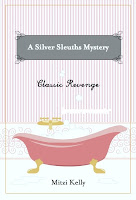by Elizabeth S. Craig, @elizabethscraig
What doesn’t matter about plotting?
It doesn’t matter how you do it as long as it works for you.
If what you’re doing isn’t
working, have you ever tried something else?
I’ve always been a very happy
organic writer/pantster. I made up my
mysteries as I went along. My agent,
frankly, was rather horrified. I’ve also
had an editor or two who were very surprised that I don’t outline. I had a
feeling that many traditionally published, prolific writers outline their books
and that I was the exception and not the rule.
I have one editor who requires
an outline for approval. I had a
tremendous problem delivering her an outline at first. The first outline was 24 pages long. My poor editor. But at first, that’s the only way I could do
them. If I had
to write an outline, I was going all the way with it…outlining every scene.
The second outline went a lot
better. I gave her three page “big
picture” of the story. I left out the
minor details and just hit the high points: suspects, killer, and how my hook
(it’s a quilting mystery series) featured into the book.
The third outline was much like
the second for this editor. The
difference was that I deviated from it nearly completely. Once I started writing the story, it took off
into a different direction. Wrapped up
in the story, I neglected to tell my editor about my deviation, which caused a
bit of a problem for an editorial meeting she was in and a cover meeting. Ugh. I
quickly filled her in and sent her the (unfinished) manuscript (which I usually
hate doing because at that point I’ve done zero editing…but it was better than
sending my long-suffering editor in blind to various conferences.)
So I’ve had some outlining
background. And I always hated coming up
with these outlines. But—I never ran into story issues when I’ve
outlined. I might go off my outline, but I never end up with a huge
plot hole, a mess of a beginning, or a poorly paced book.
On the other hand, when I haven’t outlined, I’ve run into a big problem
about 30% of the time. Not all the
time. But enough to slow me down (and I
do hate being inefficient!)
I just had a terrible first
draft experience on a book I made up as I went along. Bad enough that I’m outlining the novel I’m
about to start writing. But I’m not excited about this—I’m simply thinking that
maybe it’s become a necessary evil for me.
What
I dislike about outlines:
I feel like the time spent
writing them is better spent writing the story, promoting another book, or some
other writing-related task. This almost
embarrasses me to even admit…yes, I know outlining counts as writing. But that’s
how I feel about it.
I feel that outlines have a
tendency to confine my creativity.
I don’t like picking the
murderer until the end of the story.
I don’t like picking names
until I get to know new characters better.
Outlines remind me of the more
unpleasant assignments in my English classes.
Outlining doesn’t come
particularly naturally to me.
I hate to admit this, too,
but…I can get bored with what I’m writing when I outline because I’m skipping
the process of discovery and brainstorming.
Those are the most fun parts for me.
Pros
of outlining
I always know what I’m going to
write (I’ve always known what I was
going to write the following day, even as an organic writer. But with an outline, I know what I’ll write
even after that.
I can immediately tell if the
story I intend to write will work or not.
I can spot a bloated beginning, a saggy middle, and a bad ending right
off the bat.
I can tell if my original pick
for murderer will work or not.
I can keep better track of
various subplots, red herrings, clues, suspects, and other elements.
Where
I’ve made my peace with outlines:
I allow myself to deviate if
the story will benefit.
I don’t force myself to pick
character names for the outline if I don’t immediately have a name that I
like. I put in AA or BB instead.
I brainstorm lots of
possibilities on a separate document before I start my outline. I keep the brainstormed ideas and refer to
them in case I start running dry when following my outline.
So…this is where I am now. Waffling back and forth between outlining and
skipping it. Again, if you’ve got a
method that works for you—keep it. I’m
experimenting only because my method is suddenly letting me down a little.
Do you outline? Why or why not?



































